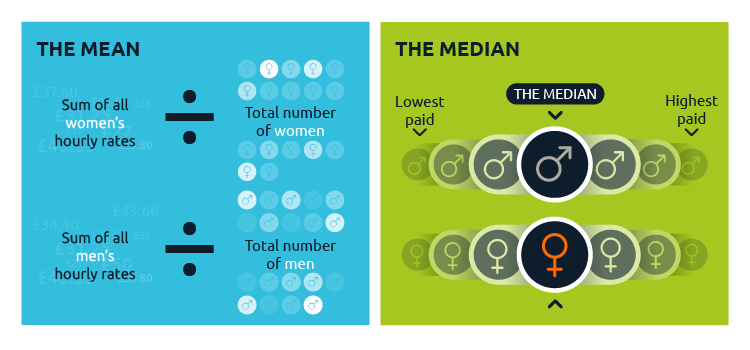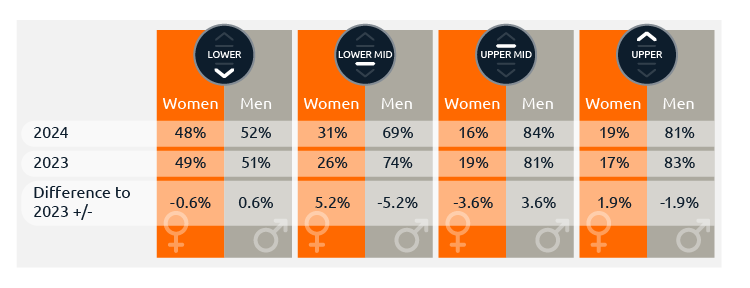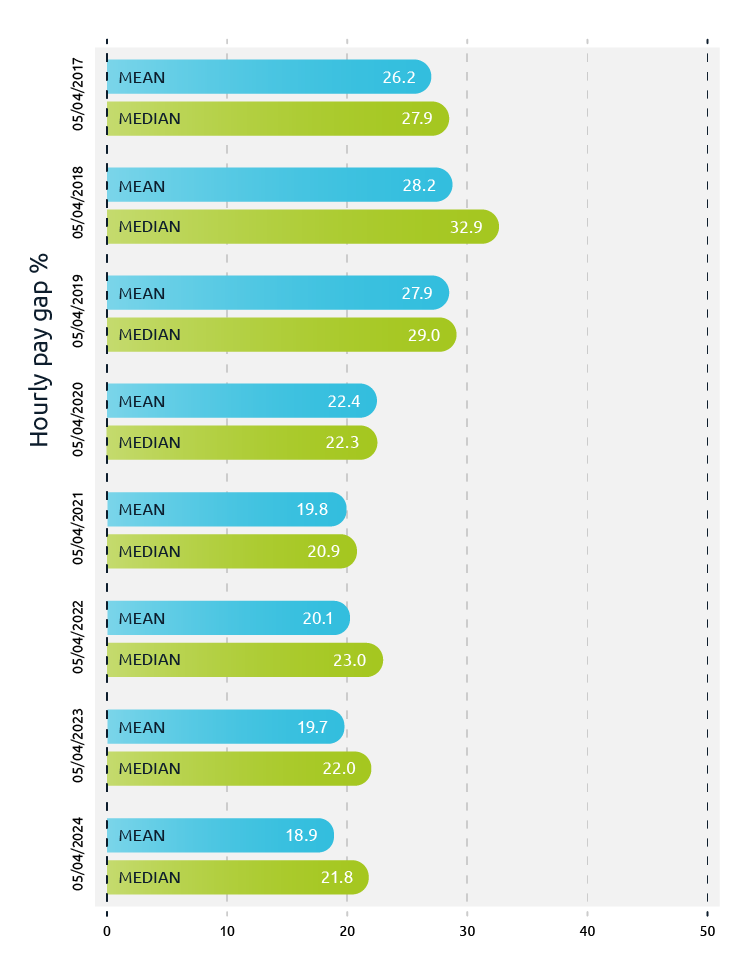UK gender pay gap 2024
Statement from our CEO
“Cambridge Consultants is committed to inclusive futures for all. It is only when individuals can bring the best versions of themselves to work that we achieve our full potential and maximise the impact of our innovation. As Leah Busque, founder of TaskRabbit puts it, “I wake up every morning and think to myself, ‘How far can I push the company forward in the next 24 hours?’”
It is progressive, unrelenting attitudes like this I see in so many exceptionally talented women at Cambridge Consultants. They remind me every day that we must continue to create environments for women to excel in all that they do and help inspire future generations to step into a world of fair and equal opportunity.”
Monty Barlow, CEO
We are fundamentally a people-based business. We recognise the significant benefits that derive from a more inclusive and diverse organisation. From entry-level roles to senior leadership, we remain committed to driving gender equality across our global business.
Gender equality is just one element of our commitment to create a truly inclusive workplace where all employees can thrive.
Whilst this report only reviews the status of our UK employees our focus on developing a culture underpinned by inclusive policy and practice has global reach.
What is the UK Gender Pay Gap?
- Since April 2017, the UK Government has required all UK companies with a headcount of 250 or more to annually publish figures on their UK gender pay gap to encourage greater focus and prioritisation on closing the gap.
- UK gender pay gap reporting calculates the difference between the hourly pay of men and the hourly pay of women in our UK business. Hourly pay includes base pay, allowances and any bonus and other incentive pay.
- Figures represent the difference between men’s and women’s hourly earnings as a percentage of men’s hourly earnings
- The gender bonus gap is the difference in the bonus pay received by men and women.
- Looking at the UK data supplied by the government the gender pay gap has been declining slowly over time.
- For reference, the ONS reported that the gender pay gap for median gross hourly earnings among all employees in the UK reduced to 13.1% in April 2024, down from 14.2% in April 2023.
- Tracking the evolution of the gap across multiple years is key to assessing progress.
- We have calculated our gender pay gaps using the methodology as required by the regulations for publishing UK gender pay gap information.
- The data in this presentation is based on a snapshot date of the 5th of April of each year to match the reporting period required by the Government.

MEAN GENDER PAY GAP
The mean gender pay gap is the difference in the average hourly pay for women compared to men, within a company.
MEDIAN GENDER PAY GAP
The median represents the middle point of a population by taking all salaries in the sample and lining them up in order from lowest to highest to identify the middle salary. The median pay gap is the difference between the hourly pay rate for the middle woman compared to the middle man.
Does having a pay gap mean women are not paid the same as men?
It is important to note that a gender pay gap is not the same as equal pay. Equal pay is the concept of paying men and women equally for equivalent work. The gender pay gap report does not report on equal pay as it does not compare pay between men and women for specific roles. We monitor equal pay and are committed to pay equally and fairly across job roles and reward our people based on their performance and contribution.
Our figures

Our 2024 calculations take into account voluntary salary sacrifice pension, childcare vouchers and Cyclescheme contributions.
We run an identical bonus scheme for men and women which includes a qualifying period from date of joining before bonus payments are made.
Employees who choose to pay their bonus into their pension are still included in the calculation.


Pay Quartiles


Understanding our UK Gender Hourly Pay and Bonus Gap
Whilst the hourly pay gap for 2024 has improved over 2023 figures a gap still exists. Our pay gap is primarily caused by three main factors;
- There are more men than women working at every career grade in the UK at Cambridge Consultants. In the 2024 data period 71% of our workforce were men and 29% were women.
- More women than men are employed in our administrative support roles.
- We have been more successful at recruiting women early in their career than those with more experience and so have fewer women in senior roles in the company than men. This is not uncommon in the technology industry and is something we are actively trying to address. The biggest impact this has is on the bonus pay gap.
As noted above, our reported gap is significantly impacted by the ratio of men to women across the organisation, particularly those at senior leadership level. Within wider diversity aims we are working to increase gender diversity in new hires and to support progression.
We recognise that we are operating in a challenging environment for women in engineering and technology. According to a 2024 report analysing 2023 Labour Force Survey data, women made up 15.7% of engineering and technology occupations, whilst making up over half (56.1%) of all other occupations combined. Source: https://www.engineeringuk.com/media/vxpgfdto/women-in-engineering-2024-update-engineeringuk-may-2024.pdf
Building on our success in recruiting women into our lower quartile roles, which continues to show a close to 50:50 split, the proportion of women in the lower mid quartile has increased by 5.2%. This increase has been as a result of new hires and progression. Whilst the proportion of women in the upper mid quartile decreased by 3.6% the proportion of women in the upper quartile increased by 1.9%, again due to a combination of progression and new hires. Of our new joiners within the 2024 reporting period 31% were women.
Undertaking additional analysis, we are proud to have gender equity in our promotion rates as a proportion of our workforce in 2024. We have, however, identified an increase in our bonus mean gap this year, increasing from 32.2% in 2023 to 33.9% in 2024. Our bonus median gap, whilst decreasing from 2023, appears large at 39.9%, which is largely due to our bonus structure. Our annual performance bonuses make up the vast majority of the monetary value calculated under ‘bonus’ for the purpose of this report. Annual bonuses are calculated as a percentage of base salary and bonus target percentages increase stepwise with seniority. Therefore, if the median man and median women sit in roles with different bonus targets, as is the case, whilst the hourly pay gap may not be that large, the bonus gap will be more so as bonus achievable is a greater proportion of that increased pay.

What is Cambridge Consultants doing to address the gap?
Regarding our UK Gender Pay Gap, our commitment to ED&I, demonstrated by including it as one of our five company goals for the past two years, has helped us show year-on-year improvement in both the mean and median gender pay gap, 8.94% and 7.14% reduction in the last six years respectively.
We recognise the importance of addressing the gap and that it will take time to create long-term, sustainable change. At CC we strive to create an inclusive future for all of our people.
Excelling at ED&I @ CC
To help us achieve our organisational ambition, and to enable us to successfully innovate, we recognise that it is vital we excel at ED&I. It is also the right thing to do! Since 2023 excelling at ED&I has been one of our 5 company goals.
Increasing our understanding and setting strategy:
Building on the specific Equity, Diversity and Inclusion survey conducted in 2022/2023 we have embedded ED&I questions into The Global CC Conversation 2025, our employee engagement survey. In this way all of our employees have an opportunity to share their lived experience of working at Cambridge Consultants so we can understand what we do well and where we can make improvements. Direct feedback from our employees is important and will help shape how we, at CC, move forward.
Having had many years of grassroots activity, supported at the highest level, we are now working at improving our understanding of where to focus our efforts. To better facilitate the execution of our ambition, last year we established a Global ED&I Steering Group, with a framework to better support and connect our employee engagement Networks. The Steering Group aligns effort on specific investment initiatives and activities within our networks to be increasingly intentional with how we approach the challenges we face as an organisation. We are delighted that our culture of inclusion has been further reflected with the founding of additional communities to actively support marginalised individuals and/or groups. Last month the Network leads came together to explore ways to collaborate, enhance and ignite change for 2025.
Early age/Outreach:
It is well recognised that there is a skills shortage for STEM employers, with a disproportionate number of vacancies in the sector. In the UK 19% of all jobs are in engineering, yet engineering vacancies account for 25% of all job adverts in the UK¹. The most recent available government workforce data, as of September 2023, shows the percentage of women making up the Core-STEM workforce in the UK has decreased from 26.9% in 2022 to 25.2% in 2023 with women engineers accounting for 10.4% of the engineering workforce².
Interest in school science among years 7 to 9 (ages 11 to 14) has declined since 2019, from 76% to 71%. However, for girls the decline has been greater, from 75% to 65%, representing a widening gender gap for this age range¹.
We recognise the importance of early years intervention in encouraging greater diversity in STEM. That’s why we actively focus on initiatives to encourage more young people to enjoy STEM in early life through our STEM Outreach programme. By partnering with outreach organisations, community schemes, and schools – providing financial support and volunteer time – we aim to provide opportunities to young people who would otherwise be likely to miss out (for example due to socio-economic deprivation, disabilities or learning differences, or young carer responsibilities).
Research reports that only 29% of girls are interested in an engineering career, compared to 63% of boys¹. There is evidence that having a STEM role model has a positive impact for girls, with 41% of girls with role models reporting an interest in STEM subjects, compared to 26% of girls without a role model. Additionally, 51% of girls with role models can imagine a future career in STEM³.
We ensure that our teams of volunteers represent an inspiring and diverse group so that every young person can see a future route and role model for themselves, rather than prematurely ruling themselves out of STEM due to feeling that it is not for them.
Our outreach activities continue to inspire and enthuse the next generation, helping to create the CC team of the future. As always, the participation from volunteers across the business has been high, with staff from across the company contributing time, effort, and energy – and in turn being rewarded by the sheer infectious joy of seeing a young person’s eyes light up as they learn something new, come to an exciting realisation about how something works, or see a potential future career path unfolding in front of them. The key aims of our STEM Outreach program are:
- Give something back locally.
- Help address the gender imbalance in STEM.
- Provide opportunities for young people who would otherwise miss out – e.g. due to socio-economic deprivation, disabilities or learning differences, or young carer responsibilities.
[1] Source: Engineering UK: https://www.engineeringuk.com/research-and-insights/our-research-reports/key-stats-infographic/
[2] Source: WISE Campaign: https://www.wisecampaign.org.uk/updated-workforce-statistics-september-2023/
[3] Source: WISE Campaign: https://www.wisecampaign.org.uk/statistics-round-up-2024/
Attracting diverse talent:
After a year of using our new applicant tracking system, we are now better positioned to make more informed, data-driven decisions about our recruitment process. We continue to review our recruitment channels and expand access to more diverse talent pools. Our job advertisements use inclusive language to ensure they appeal equally to both men and women.
We have actively made changes to our interview process and the information provided to candidates, ensuring it is inclusive and accessible. Additionally, we remain mindful of the composition of our interview panels and strive to achieve greater gender equality in our interview line-ups whenever possible.
Early Careers
We are continuing to focus on broadening the diversity of our early careers talent pool across Scholarship, Apprenticeship, Internship and Graduate positions. By engaging with a wider range of academic institutions and university societies, we aim to drive greater representation, particularly among women in STEM fields. This year, we have partnered with five Women in STEM societies, hosting panels and activities to drive engagement and ensure strong female representation across our initiatives. Additionally, we’ve targeted Women in STEM events and are leveraging less gender-represented skill sets through video campaigns, including skill set interviews, on platforms like Gradcracker. To complement these efforts, we’ve developed inspiring multimedia content for multi-channel campaigns, ensuring that our recruitment processes, onboarding, and engagement experiences are inclusive, positive, and supportive of diverse talent.
Commitment to increase number of women in senior roles
We are committed to driving diversity at every level of the organisation, including greater representation of women in senior leadership roles.
Succession Planning conversations aim to focus us on becoming more pro-active in identifying and progressing talent through the company, with an emphasis placed on identifying under-represented groups.
Women made up 50% of the participants on CC’s flagship leadership development programme, “Emerging Leaders”. Learners on this programme benefit from 1-2-1 coaching support and mentorship from members of the exec, building their confidence and leadership capability. By investing in the development of the next generation of female talent, we aim to combat underrepresentation of women in senior roles.
Work/life balance
Our aim is to create gender parity in the workplace and encouraging more equity across all parents is one way we’re achieving this. We demonstrate a progressive approach to New Parent Leave and provide strong support, assisting new parents with building family relationships and balancing work and career opportunities. Our New Parent Leave Policy is gender neutral giving all new parents, whether by birth, as a result of adoption or by surrogacy arrangement, 13 weeks paid parental leave, regardless of gender or sexual orientation.
We have introduced the right to request flexible working from the day that someone joins our business.
We continue to adopt and promote agile and flexible working practices to help all employees balance their personal commitments.
Employee engagement
Our Women’s+ Network that was launched in 2021 has become established and aims to create an empowered community of women and allies working together to promote equity and inclusion in the workplace. Through our coordination with other Networks we will continue to explore cross-cutting topics around mental health, parental support, disability, ethnicity and LGBTQ+. Additionally, we have a Women’s Health Hub bringing together our cross-disciplinary thinking to research and consider ways in which we as a business can create more equity in health and wellbeing through our strategy consulting, product development and service design.

